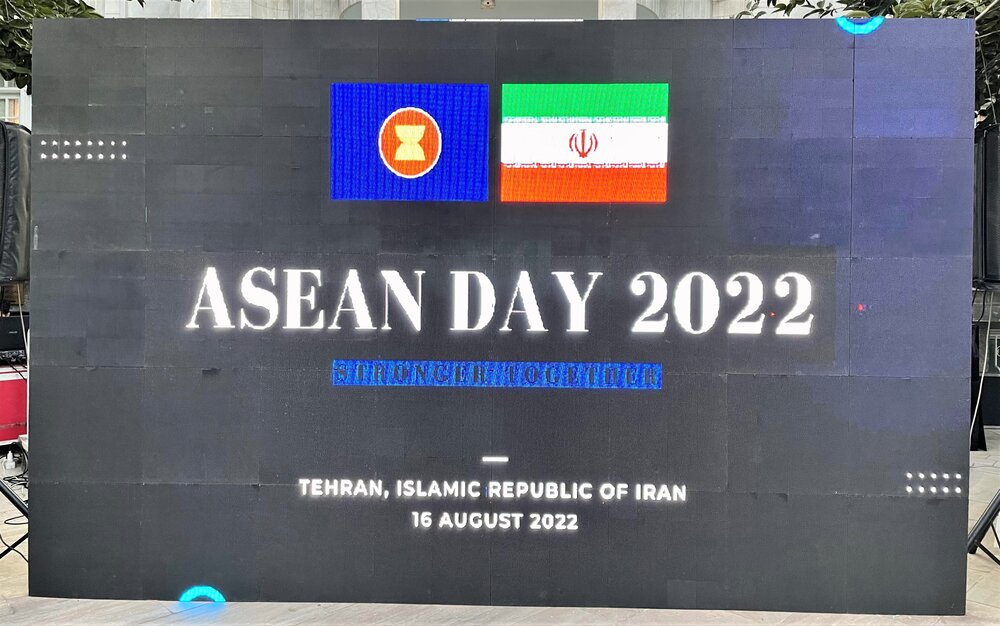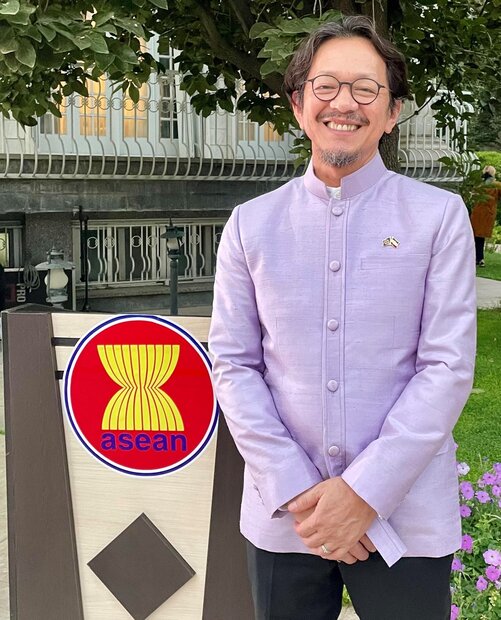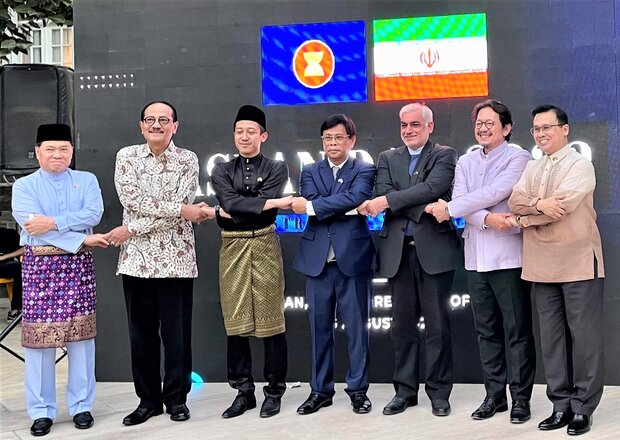ASEAN Day 2022 celebrated in Tehran

TEHRAN- ASEAN Day 2022 was celebrated at the place of Royal Thai Embassy in Tehran on Tuesday, attended by ambassadors of some of the member countries in Iran as well as some Iranian officials, and also officials from other countries, including Russian and Indian ambassadors in Tehran.
Delivering a speech at the beginning of the ceremony, Reza Zabib, the assistant to Iranian Foreign Minister Hossein Amir-Abdollahian and director general of Asia-Pacific Department at the Foreign Ministry, said, “As Mr. Abdollahian stated at the beginning of assuming office, Asia, including South East Asia is a major priority in Iranian foreign policy.”
He continued to say:
Accordingly, the policy of the government of Mr. Raisi is to strengthen friendly relations with the countries in this region, being aware of the friendly and constructive approach of South Asian countries and confident that relations between the Islamic Republic of Iran and these friend countries in the region will be further strengthened and consolidated peace and friendship and secure common interests.
Through its desirable conduct in the past five decades, ASEAN has proved to be driving force for peace and stability and development in the region, and has become a valuable platform for promoting cooperation among its member states, especially in the area of economy, and in such a way over the past few years it has succeeded in creating an ecosystem of stability and prosperity in South East Asia.
The conduct and success of ASEAN has not only contributed to the peaceful settlement of challenges, but also to boosting democracy and economic growth and regional prosperity.
To continue this constructive role, ASEAN ought to be able to adapt itself to new requirements in the current changing world and overcome current challenges.
As a country with practical practice in contributing to maintaining regional peace, the Islamic Republic of Iran believes that the only way to maintain stability and security for prosperity of the people in South East Asia is to strengthen mutual cooperation and develop regional set-ups by the ASEAN member states themselves.
Aiming to improve the level of relation with ASEAN and using bilateral and multilateral potential of the ASEAN member states and in compliance with the policy of promoting multilateralism, Islamic Republic of Iran has shown its strong will to enhance cooperation with ASEAN member states through joining the Treaty of Amity and Cooperation in South Asia (TAC) (embodies universal principles of peaceful coexistence and friendly cooperation among states in Southeast Asia), presenting a roadmap for cooperation between the Islamic Republic of Iran and ASEAN with joint projects in the fields of science, tourism, and health, which has been submitted to the ASEAN Secretariate, shows that the Islamic Republic of Iran is serious and has a forward looking prospective to expand cooperation with the Association.
We do hope that ASEAN member states will further consult with the Association’s Secretariate to smoothen and implement the joint projects of Iran and ASEAN.
In the end, once again I reiterate the strong will of the people and government of the Islamic Republic of Iran to continue and strengthen cooperation with the ASEAN member states with a view to utilize the prospective potentials for the benefit of our people and strengthen stability and progress in the East and West Asia and to help create and expand more inclusive peace and friendship with a discourse way under rule of law in the international relations.
ASEAN members willing to have closer ties with Iran: Thai ambassador
“We, all the members of the association, would like to have closer relations, especially in terms of economic and trade and investment, with Iran”, Thai Ambassador to Iran Worawoot Pongprapapant told the Tehran Times in an exclusive interview on the sidelines of the above-mentioned ceremony.
“And this is what that I can say we are looking forward very much having close relations with Iran in terms of economics and trade”, the ambassador reiterated.
“We see the potentials of Iran, especially when you talk about almost a hundred million population, and Iran is a big market for ASEAN products”, he noted, adding, “And also it could be the transportation hub for our products to enter countries in the Central Asia or Eastern Europe and Iran is in a very strategic location for our products.”
“We are having some sort of consideration, especially some member countries of ASEAN, for importing medical equipment form Iran, meaning that Iran is reputable in terms of having high-quality medical products, and also the medicine”, the envoy stated.

He went on to say, “And for us, Thailand, we conduct discussion between exporters and importers of Thailand and Iran in terms of having some sort of trade in the area of rice and fertilizer; negotiation has been going on, and it means that we see the potentials and Iranians also see the potential for business.”
“We will be discussing and I hope that the trade relations between ASEAN and Iran could be improved, especially when we see the prospect of JCPOA (Iran’s nuclear deal known as Joint Comprehensive Plan of Action), and really hope that the parties will be about to conclude soon, that would bring the prospect even closer, even clearer between ASEAN and Iran.”
Answering to a question about the major challenges in the way of trade between the two sides and the solution to remove them, the ambassador said, “Iran has been under sanction for many years, and they have to be relying on themselves and they have so many products produced locally”, adding, “And it seems difficult for a product from ASEAN to enter the Iranian market because of the tariffs which are very high and also some sort of standards that make it difficult for us to enter Iranian market.”
“There is one thing that I think we can do together to make the trade done more easily; it is to have some sort of trade agreement among us; with the trade agreement this kind of tariff could be reduced and also the tax will be reduced; they would make trade between us more easily”, he commented.

As announced by Secretary of Iran’s Trade Promotion Organization (TPO)’s ASEAN Trade Promotion Desk Mohsen Rezaei-Pour, the value of Iran's exports to the ASEAN member countries rose 33 percent in the previous Iranian calendar year 1400 (ended on March 20) from the preceding year.
The Islamic Republic’s export to the mentioned countries reached $2.371 billion in the past year, the official said.
Indonesia was the top export destination for Iranian goods among the ASEAN member states in the previous year, importing $1.101 billion worth of commodities, Reza-Pour noted, adding exports to Indonesia rose 63 percent in terms of value.
During the period under review, Thailand was Iran’s second-largest export destination in this union; the Islamic Republic exported 1.241 million tons of goods worth $784 million to this country, according to the official.
The exports to Thailand increased by 59 percent in terms of value compared to the preceding year.
The top exported items to Thailand include steel ingots, steel sections, zinc, chicken viscera, bitumen, and vaseline, Rezaei-Pour said.
Association of Southeast Asian Nations (ASEAN) is a political and economic union of 10 member states in Southeast Asia, which promotes intergovernmental cooperation and facilitates economic, political, security, military, educational, and sociocultural integration between its members and countries in the Asia-Pacific.
The association was established on August 8, 1967 in Bangkok, Thailand, with the signing of the ASEAN Declaration (Bangkok Declaration) by the Founding Fathers of ASEAN, namely Indonesia, Malaysia, Philippines, and Thailand.
As set out in the Declaration, the aims and purposes of ASEAN are to accelerate economic growth, social progress, and cultural development in the region, to promote regional peace, collaboration and mutual assistance on matters of common interest, to provide assistance to each other in the form of training and research facilities, to collaborate for better utilization of agriculture and industry to raise the living standards of the people, to promote Southeast Asian studies and to maintain close, beneficial cooperation with existing international organizations with similar aims and purposes.
